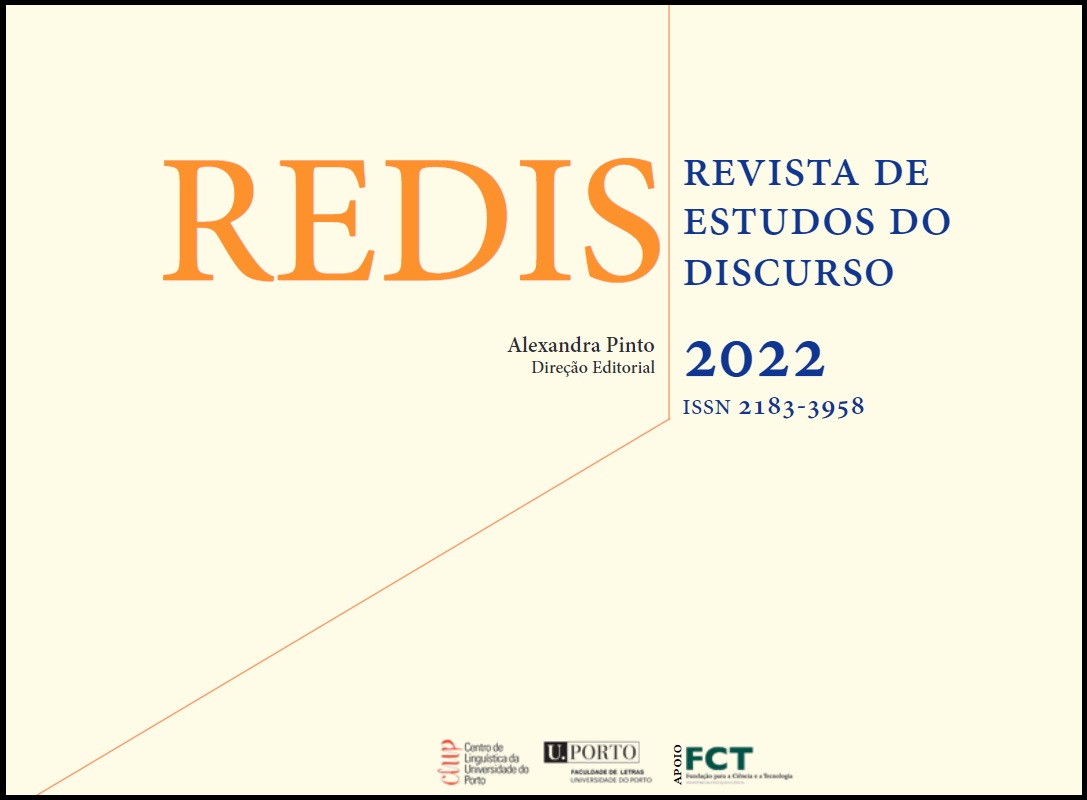O estabelecimento de relações de discurso como manobra discursiva no processo de gestão de faces e territórios em uma entrevista jornalística
DOI:
https://doi.org/10.21747/21833958/red11a4Palavras-chave:
Entrevista escrita, Relações de discurso, Processo de figuraçãoResumo
Ao longo das interações, os interlocutores se valem de diversas manobras discursivas para atingirem seus objetivos comunicativos. Uma dessas manobras é o estabelecimento de relações de discurso para articular constituintes textuais com o objetivo de gerir faces e territórios. Sob esse prisma, o presente artigo investiga de que forma as relações de discurso interativas (argumento, contra-argumento, reformulação, preparação etc) atuam no processo de gestão de faces e territórios (processo de figuração) em uma entrevista escrita, publicada em 2019 na seção Entrevista da 2ª da Folha de S. Paulo, cujos participantes foram: Anna Virginia Balloussier (AVB), jornalista da Folha, e Marcello Crivella (MC), que, na época, era prefeito do Rio de Janeiro. Partimos da hipótese de que essas relações de discurso desempenham um importante papel no processo de figuração, atuando, assim, como recursos interacionais por meio dos quais os participantes da entrevista tentam alcançar seus objetivos comunicativos e negociar imagens identitárias. Para realizar essa análise, utilizamos como referencial teórico-metodológico o Modelo de Análise Modular do Discurso, uma abordagem cognitivo-interacionista que visa dar conta da complexidade discursiva decompondo-a em unidades menores.
Referências
Berrendoner, A. (1983). “Connecteurs pragmatiques” et anaphore. (V. 5). Genebra: Cahiers de lin-guistique française, pp. 215-246.
Braga, P. B. (2021). O papel do comentário metadiscursivo em debate eleitoral polilogal: estratégia discursiva no jogo de faces [Dissertação de Mestrado, Universidade Federal de Minas Gerais]. Repositório UFMG. https://repositorio.ufmg.br/handle/1843/40190.
Charaudeau, P. (2013). Discurso das mídias (2.ed). São Paulo: Contexto.
Cunha, G. X. (2014). Para entender o funcionamento do discurso: uma abordagem modular da complexidade discursiva. Curitiba: Appris.
Cunha, G. X. (2015). As relações retóricas e a negociação de faces em debate eleitoral. Confluência, pp. 205238.
Cunha, G. X. (2020a). Elementos para uma abordagem interacionista das relações de discurso (V. 36). Montevidéu: Linguística, pp. 107-129.
Cunha, G. X. (2020b). Uma abordagem interacionista para o estudo do papel das relações de discurso na construção conjunta de imagens identitárias. Filologia e Linguística Portuguesa, 22(2), 151-170.
Cunha, G. X., & Braga, P. B. (2016). O comentário metadiscursivo como estratégia argumentativa em debates eleitorais. Revista Eletrônica de Estudos Integrados em Discurso e Argumentação, pp. 101118.
Cunha, G. X., & Braga, P. B. (2018). Definindo o comentário metadiscursivo em uma perspectiva interacionista da Análise do Discurso. Scripta, 22(44), 171-188.
Essenfelder, R. (2005). Marcas da presença da audiência em uma entrevista jornalística. Revista Virtual de Estudos da Linguagem-ReVel, 3(4), 1-23.
Fávero, L. L. (2000). A entrevista na fala e na escrita. Fala e escrita em questão. São Paulo: Humani-tas, pp. 79-97
Fávero, L. L., & Andrade, M. (1998). Os processos de representação da imagem pública nas entrevistas. Estudos de língua falada-variações e confrontos. São Paulo: Humanitas, pp. 153-177.
Goffman, E. (1973). La mise en scène de la vie quotidienne (V. 2). Paris: Minuit.
Goffman, E. (2011). Ritual de interação: ensaios sobre o comportamento face a face. Petrópolis: Vozes.
Hoffnagel, J. C. (2002). Entrevista: uma conversa controlada. Gêneros textuais e ensino. Rio de Janeiro: Lucerna, pp. 180-193.
Kerbrat-Orecchioni, C. (2006). Análise da conversação: princípios e métodos. Parábola.
Malta, A. T. A. (2015). Proximidade e afastamento: diferenças entre a entrevista pessoal e a distância. Repositório Universidade de Brasília. https://bdm.unb.br/bitstream/10483/11684/1/2015_AnaTere-saAlvesMalta.pdf
Rossari, C. (1996). Identification d’unités discursives: les actes et les connecteurs. Cahiers de Lin-guistique Française, (18), 157-177.
Roulet, E., Auchlin, A., Moeschler, J., & Rubattel, C. (1987). L’articulation du discours en français contemporain (V. 11). Peter Lang Gmbh, Internationaler Verlag Der Wissenschaften.
Roulet, E. (1980). Stratégies d’interaction, modes d’implicitation et marqueurs d’illocutoire in Ac-tes de langage et structure de la conversation. Cahiers de linguistique française, (1), 80-103.
Roulet, E. (1986). Completude interactive et mouvements discursifs. Cahiers de linguistique française, (7), 189-206.
Roulet, E. (1987). Complétude interactive et connecteurs reformulatifs. Cahiers de linguistique françai-se, (8).111-140.
Roulet, E. (1988). Variations sur la structure de l’échange langagier dans différentes situations d’inte-raction. Cahiers de linguistique française (9), 27-37.
Roulet, E. (1991). Vers une approche modulaire de l’analyse du discours. Cahiers de linguistique fran-çaise, (12). 53-81.
Roulet, E. (1992). On the structure of conversation as negotiation. In H. Parret & J. Verschueren, (On) Searle on Conversation (Eds.), pp. 91-100.
Roulet, E. (1996). Une description modulaire de l’organisation topicale d’un fragment d’entretien. Cahiers de linguistique française, (18), 11-32.
Roulet, E. (1997). A modular approach to discourse structures. Pragmatics, 7(2), 125-146.
Roulet, E. (1999). La description de l’organisation du discours: du dialogue au texte. Paris: Didier.
Roulet, E. (1999a). Um modelo e um instrumento de análise sobre a organização do discurso. Mari, H. et al., Fundamentos e dimensões da Análise do Discurso. Belo Horizonte: FALE/UFMG, pp.139-166.
Roulet, E. (2003). Une approche modulaire de la problematique des relations de discours. Mari, H. et al., Análise do discurso em perspectivas. Belo Horizonte: FALE/UFMG, pp. 149-178.
Roulet, E. (2004). Les relations de discours rhétoriques et praxéologiques dans la description des propriétés des constituants parenthétiques. Travaux de linguistique, (2), 9-17.
Roulet, E. (2006). The description of text relation markers in the Geneva model of discourse organiza-tion. In K. Fischer, Approaches to discourse particles. Brill. Pp. 115-131.
Roulet, E., Filliettaz, L., & Grobet, A. (2001). Un modèle et un instrument d’analyse de l’organisation du discours. Peter Lang Gmbh, Internationaler Verlag Der Wissenschaften.
Schneuwly, B., & Dolz, J. (1999). Os gêneros escolares. Das práticas de linguagem aos objetos de ensino. Revista brasileira de educação, (11).
Downloads
Publicado
Como Citar
Edição
Secção
Licença
Direitos de Autor (c) 2022 Redis: Revista de Estudos do discurso

Este trabalho encontra-se publicado com a Licença Internacional Creative Commons Atribuição 4.0.
Os autores cedem à REDIS: Revista de Estudos do Discurso, o direito exclusivo de publicação dos seus textos, sob qualquer meio, incluindo a sua reprodução e venda em suporte papel ou digital, bem como a sua disponibilização em regime de livre acesso em bases de dados.




